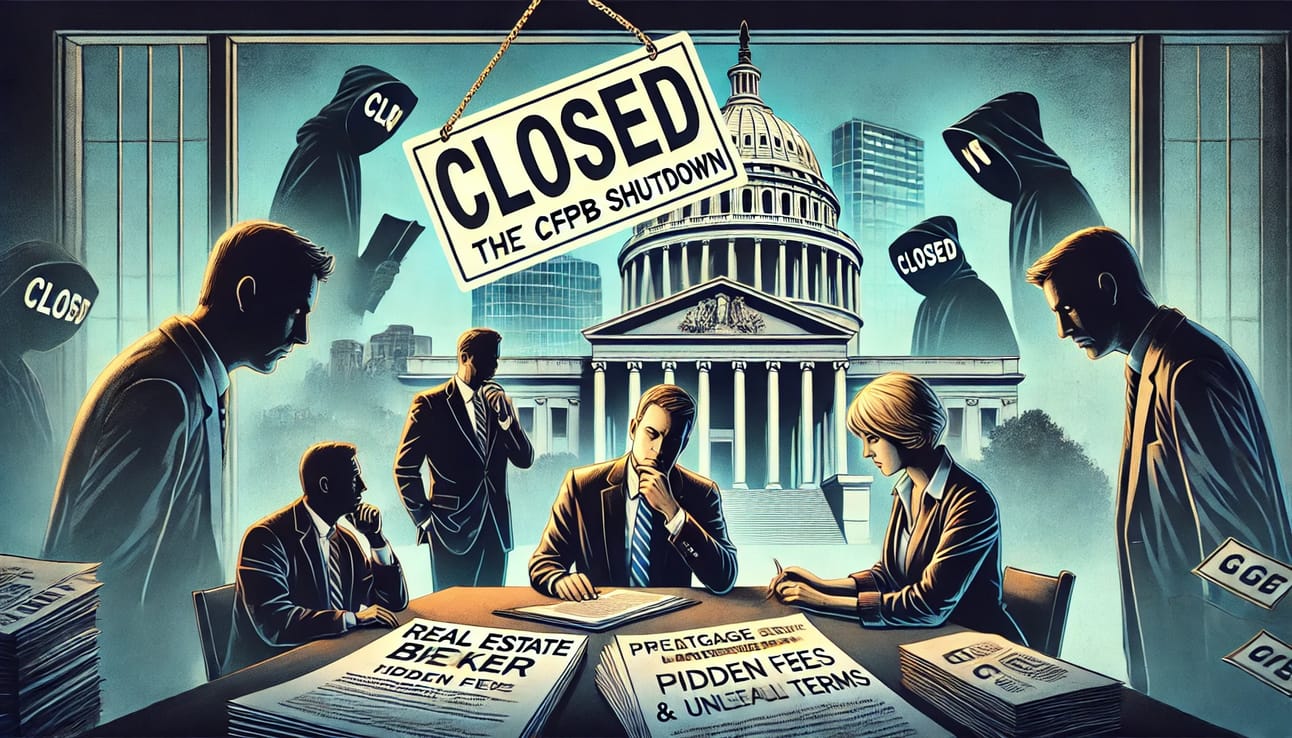Trust This.
By Joseph E. Seagle, Esq.
👋 Happy Friday! Today is, of course, Valentine’s Day. You know the assignment … ❤️
❗Situation Awareness: Our offices will be closed on Monday in observance of President’s Day.
Obituary: Many readers knew and were mentees of Jack Shea when he and Mark Warda appeared on stage together at seminars and presentations. Unfortunately, Jack passed away in December. In case you missed it, his obituary is available online.
1 big thing: CFPB is Gone: What It Means for Real Estate Pros

The Consumer Financial Protection Bureau (CFPB) has been effectively dismantled under the combined efforts of Donald Trump, his Treasury Secretary Robert Bessent, and Elon Musk’s Department of Government Efficiency (DOGE). The agency, originally created in the wake of the 2008 financial meltdown to protect consumers from predatory financial practices, had long been a target of conservative critics who viewed it as overreaching. Now, its closure signals a major shift in regulatory oversight that directly impacts real estate entrepreneurs, mortgage brokers, title agents, and REALTORS®.
Why It Matters: The CFPB’s dismantling removes a key regulatory safeguard for real estate transactions, mortgage lending, and consumer protections. With federal oversight gone, industry professionals will need to rely on state-level regulations, private legal action, and self-regulation to maintain integrity in financial transactions.
What’s Changed:
No More Mortgage Oversight: The CFPB previously enforced fair lending rules under the Truth in Lending Act (TILA) and the Real Estate Settlement Procedures Act (RESPA). Without these protections, lenders may reintroduce hidden fees, predatory loan terms, and less transparency in mortgage disclosures.
Increased Risk of Fraud: Title agents and REALTORS® will see more cases of wire fraud, unclear settlement disclosures, and unethical lending practices that were previously monitored.
Harder to Fight Foreclosure Abuses: The CFPB cracked down on unfair foreclosure practices. Without it, distressed homeowners and real estate investors facing default may have fewer legal remedies.
State Regulations Become Crucial: Some states, such as California and New York, are expected to create state-level CFPB alternatives, while others, like Florida and Texas, may embrace a fully deregulated market.
What It Means for Real Estate Pros:
Investors & Entrepreneurs: Riskier financing deals, potential return of abusive hard money lending practices, and greater foreclosure uncertainty (i.e. tougher to obtain reliable payoff and reinstatement estoppels for a reasonable cost).
Mortgage Brokers: Looser lending standards but increased civil legal liability for unethical practices.
Title Agents & REALTORS®: More fraud risks, less regulatory protection for consumers, and an increased need for industry self-regulation.
Borrowers: A return to tax and insurance escrow account errors, delayed and misapplication of payments, and other abusive servicing practices with no clearinghouse for complaints.
What’s Next: With the CFPB shuttered, real estate professionals must stay vigilant. Best practices, independent legal compliance, and careful lender vetting will be critical to navigating this new regulatory landscape.
The Bottom Line: The CFPB’s closure reshapes the real estate industry, shifting responsibility from federal regulators to professionals on the ground. Adaptation and vigilance will define success in this new era of deregulation.
2. Why Musk Wanted the CFPB Gone—And What It Means for Consumers

Elon Musk played a key role in dismantling the Consumer Financial Protection Bureau (CFPB), fueling speculation about his motivations. The move benefits not only Musk’s ventures but also fintech companies seeking fewer regulatory constraints. The absence of the CFPB will reshape consumer finance, leaving gaps in oversight for loans, credit reporting, and banking fees.
Why It Matters: The CFPB, funded by income of the Federal Reserve rather than tax revenues, previously served as a watchdog against not only unfair lending practices, but also deceptive banking fees, and predatory financial products. Its shuttering could lead to higher costs and fewer protections for everyday consumers.
CFPB’s annual budget from the Federal Reserve had grown from $161 million in 2011 to $721 million in 2023.
The Bureau had returned $21 billion to Americans through enforcement actions that had required bad actors to return fees and costs to consumers.
One example includes the time CFPB settled with Wells Fargo, forcing it to pay consumers $3.7 billion for more than 16 million customer accounts that were subjected to illegal practices such as unauthorized creation, misapplied payments, wrongful foreclosures, and incorrect fees and interest charges.
Some speculations on why Musk wanted to shut it down:
Fewer restrictions on fintech innovation: Musk’s interests in digital payments and decentralized finance (DeFi) align with a regulatory-free environment. His plans for X to become a platform for online payments and all other things bank-like had run into roadblocks with CFPB in the past.
Tesla’s history with the CFPB: The agency investigated Tesla’s financing arm for allegedly misleading consumers about EV lease terms and loan disclosures.
Lower costs for financial services: Musk’s X Payments platform and other fintech efforts could expand rapidly without regulatory interference.
Industries That Benefit:
Fintech & Crypto: DeFi startups and digital banking apps can operate with fewer compliance burdens.
Big Banks & Lenders: Without CFPB enforcement, banks may reintroduce higher overdraft fees and credit card interest hikes.
Auto Financing: Tesla and other automakers gain more flexibility in structuring and disclosing vehicle loans and leasing terms.
Impact on Consumers:
Auto Loans: Less oversight means possible hidden fees, higher interest rates, and fewer loan modification options.
Credit Reporting: CFPB held credit bureaus accountable for errors; without it, fixing mistakes could become harder for consumers.
Bank & Credit Card Fees: The CFPB cracked down on junk fees; now, banks may quietly reinstate them.
Predatory Lending: Payday lenders and high-interest financial products could make a comeback without regulatory scrutiny.
What’s Next: While state regulators and lawsuits may fill some gaps, the financial sector is now operating with significantly less federal oversight. Consumers should stay vigilant by reviewing bank, credit card, and mortgage statements (including tax and insurance escrow accounts), scrutinize loan agreements, and push for clearer state-level protections to counterbalance this regulatory rollback.

In this week’s Trust This. video, I explain why estate planning doesn’t just address what happens when you’re gone. A complete estate plan also addresses what happens to your assets, your children, and yourself when you’re unable to speak or act for yourself.
3. Catch up fast

An Indiana HUD voucher recipient will lose his housing benefits after honestly disclosing his one-time cannabis gummy use. HousingWire
How Trump’s tariffs could affect billions in Central Florida trade. Orlando Business Journal
The Trump tariffs’ effects on the national housing supply. National Business Journal
U.S. housing market faces historic decline. MPAMag Online
Housing supply is piling up as sellers enter the market while buyers stay on the sidelines. Redfin
U.S. inflation numbers worsen in January. AP
The Fed will be in no hurry to lower its lending interest rate any time soon. CNBC
4. Closing Thought:

In Never Split the Difference, Chris Voss describes a tactic called the “Is this the end?” or “Have you given up on this?” question. This is a powerful way to re-engage someone who has gone silent or seems unwilling to negotiate further.
How It Works:
Instead of pushing for a response, you ask a simple but emotionally charged question:
“Have you given up on this?”
This phrasing is strategic because it taps into the human instinct to avoid being perceived as someone who gives up or quits.
The question is designed to trigger a “No” response, which makes the other person feel in control. People are more comfortable saying “No” than “Yes” because it feels like they are protecting themselves rather than committing to something they don’t want.
Once they respond, it often opens the door for further discussion and negotiation.
Why It Works:
It’s Non-Confrontational – Instead of pressuring someone for an answer, you give them a way to re-engage on their own terms.
Triggers an Emotional Response – Most people don’t like to think of themselves as quitters.
Puts you in a Stronger Position – The person is now explaining themselves to you rather than just ignoring or shutting down communication.
When to Use It:
When a negotiation has stalled and the other party has gone silent.
When a deal seems to be slipping away.
When you need to re-establish communication without sounding desperate.
It’s a subtle yet powerful way to restart the conversation and gain leverage in negotiations.
We hope you found this helpful — any feedback is appreciated and can be shared by hitting reply or using the feedback feature below.
Was this email forwarded to you? Subscribe here.
Have an idea or issue to share? Email us.
Connect with us using your preferred social media and website links for MyLandTrustee and Aspire Legal Solutions.
Our mailing address: PO Box 547945, Orlando, FL 32854-7945
Our physical address: 1901 West Colonial Drive, First Floor, Orlando, FL 32804
Be on the lookout for our next issue! 👋
Some of the links in this email may be affiliate links. If you click on these links and make a purchase, we may receive a commission at no additional cost to you. Rest assured, we only recommend products and services we trust and believe in. Your support is greatly appreciated!